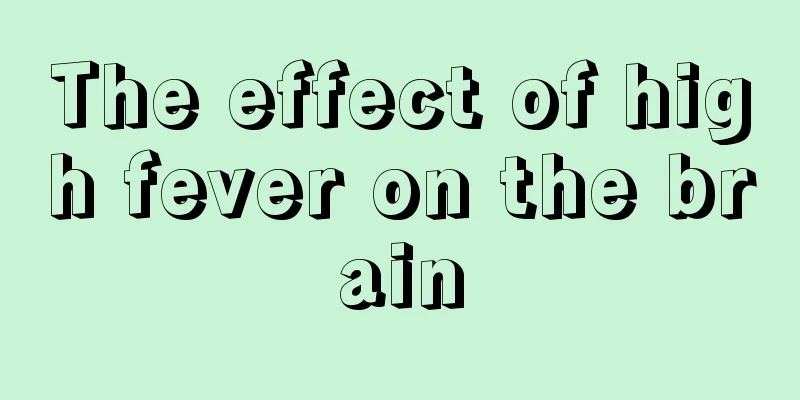The effect of high fever on the brain

|
If you have a persistent high fever, you must take some antipyretic drugs, because high fever will affect the brain's intelligence, especially for some babies, whose intelligence is at a very critical stage of development. If the intellectual development is delayed due to high fever, it is not worth the loss. There are many patients with encephalitis caused by high fever, so what are the effects of high fever on the brain? Can a fever damage your brain? The basic component of brain cells is protein, which is usually destroyed gradually at temperatures above 42°C. Normal fever rarely exceeds this temperature, so there is no need to worry about burning your brain. Unless the fever is caused by encephalitis or meningitis, it will not cause brain damage. Fever itself is not terrible. The important thing is to find the cause and treat it accordingly. A common cold usually causes a fever for 2 to 4 days. If you are active and eating normally, you don't need to worry too much. What exactly is “febrile convulsion”? Febrile convulsions (formerly known as high fever convulsions) are common in children under 5 years old. As the name suggests, it is a type of convulsion that occurs when the patient has a high fever. It usually occurs within 24 hours after the onset of fever, with an incidence rate of 3% to 5%. According to the 2011 American Academy of Pediatrics (AAP) standards, the fever state during febrile seizures is a rectal temperature ≥ 38.5 ℃ (or an axillary temperature ≥ 38 ℃). When the body temperature is too high, the nervous system is easily in an excited state, but children's nervous systems are often not fully developed and their ability to suppress excitement is weak, leading to transient brain and nerve dysfunction. In order to rule out encephalitis, the doctor suggested that Xiaoyan go to the Department of Neurology for further examination. Unexpectedly, while he was still waiting outside the neurology clinic, he had another seizure due to a rebound in body temperature. It was less than 4 hours since the last attack, and his mother was almost scared to tears. "After taking the child to the next clinic, we let him lie flat and tilt his head to one side to keep his airway open (note to parents: this can also be done if he has an attack outside the hospital), and then we gave him oxygen. After 2 minutes, his symptoms eased, and he hasn't had another attack since." Yuan Zhefeng, chief physician of the Department of Neurology at Zhejiang University Children's Hospital, who was in charge of the patient at the time, said that febrile convulsions "come and go quickly," but if Xiaoyan's symptoms last for more than 5 minutes (some may even last 30 minutes or more), he will need anticonvulsant treatment to avoid damage to brain cells, and he may need to be hospitalized for further intervention. Experts remind that when children have a fever, they should not wear too many clothes to cover their sweat, otherwise the heat in the body cannot be effectively dissipated, which can easily cause febrile convulsions, cramps, arrhythmias, etc. |
<<: Do I need to wash off the vitamin E after applying it?
>>: When is the safest time to have sex?
Recommend
Chilean scientists crack the mechanism of gastric cancer spread
Researchers from the University of Chile Hospital...
What should not be eaten with King Oyster Mushroom? Four aspects to pay attention to
King Oyster Mushroom is a kind of oyster mushroom...
You can tell where the disease is by looking at the face
Medical experts say that 70% of health problems a...
What is the reason for waist pain and back pain? This will be very effective
In real life, more and more people suffer from wa...
What Chinese medicine is good for advanced lung cancer? Three Chinese medicine prescriptions for advanced lung cancer are recommended
Lung cancer is a malignant disease with a relativ...
What should we do to prevent small cell lung cancer
With the worsening of air pollution, the incidenc...
What does your body do in 24 hours a day
Sometimes we make some plans for the day, but do ...
How many types of precancerous lesions are there for laryngeal cancer?
Precancerous lesions of laryngeal cancer include ...
Can pregnant women use disinfectant?
Most women will go through the process of pregnan...
Does Gorgon Fruit need to be fried
Generally speaking, water chestnuts need to be dr...
What are the symptoms and clinical manifestations of menopausal syndrome
When women reach a certain age, they will become ...
How to test the acidity and alkalinity of water
In life, water is a substance we use frequently. ...
How to treat peripheral lung cancer in the early stage? There are three ways to treat peripheral lung cancer in the early stage
Peripheral lung cancer can be cured, especially i...
Complications and treatment methods caused by radiotherapy and chemotherapy in the treatment of nasopharyngeal carcinoma
The treatment of nasopharyngeal carcinoma often a...
There was a sudden rumbling sound in my ears
The guidance for diagnosing the cause of tinnitus...









